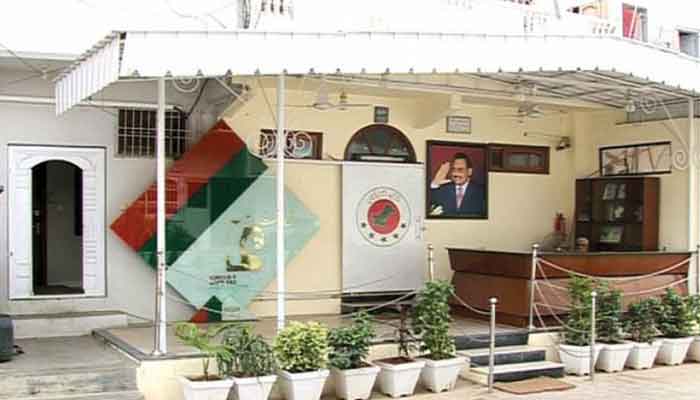From Nine Zero to ground zero: a groundbreaking raid that ended MQM’s reign of fear
A groundbreaking raid was conducted by the Sindh Rangers on this day, five years ago. It then turned out to be a historical watershed moment for the Muttahida Qaumi Movement – and, in fact, for Karachi, too.
On March 11, 2015, the paramilitary force carried out at a raid at the Nine Zero — the famed and long-feared headquarters of the MQM in Karachi’s Azizabad neighbourhood.
For law enforcers, and political and security analysts, the raid caused the MQM to lose the aura of invincibility in the metropolis and changed the city’s security and political dynamics completely.
On that day, in the wee hours, a heavy contingent of hooded Rangers personnel raided the Nine Zero, as well as several nearby houses. In the hours that followed, the Rangers found dozens of weapons and arrested dozens of party workers. Some of them were facing murder charges, including Faisal Mota, who was convicted for the murder of Geo News reporter Wali Khan Babar in 2011. MQM’s senior leader Amir Khan was also taken into custody. One political worker was killed by gunfire during the raid.
“That raid was a tipping point for the MQM. Or, to put it bluntly, it was the beginning of the MQM’s end,” says a senior police officer, who requested anonymity. The officer, who has been involved in a recent crackdown in the city, says the 2015 raid ended the impression that the activities at Nine Zero were above the law.
“To conduct this significant raid, the law enforces did a lot of homework. And when it happened, it sent shockwaves across the country.”
When the MQM was formed, the Nine Zero was party founder Altaf Hussain’s house. The place was given this name because of the last two digits of its then phone number: 673-690. From there, the MQM had been running the party’s affairs through 26 sectors and 207 units since its inception in 1984.
When then former prime minister Nawaz Sharif gave the green light to the paramilitary forces in September 2013 to launch a major crackdown on various criminal militant groups in Karachi, the security operation initially targeted the Taliban’s various factions operating in the Pashtun neighbourhoods in the city and criminal gangs of Lyari locality.
However, after weakening them, the dragnet of the operation was thrown wider, targeting the MQM, the city’s major political party having both political and militant wings. They also targeted other political groups, including the Awami National Party, the Pakistan People Party and the Sunni Tehreek, which were involved in supporting criminal networks but at a smaller level.
Interviews with paramilitary officials during the peak of the operation suggest that it was the operation’s strategy not to open several fronts against various kinds of militant groups in the city all at once. Meanwhile, they gained enough time to design the operation and its modus operandi and to plant informers within the party’s ranks after ascertaining the strengths and weaknesses of the past operations against the MQM in 1990s.
“This time, the operation was more targeted and intelligence-based, and did not give any opportunity to the political party to portray it an operation against the Muhajir community,” said a senior paramilitary official in an earlier interview with The News. “The raids targeting the MQM militant cadres were based on information coming from within the party and helped in weakening the party’s militant wing.”
Because of it, unlike the operation in 1992 in which several police officers and even serving army officer embraced martyrdom, the Rangers did not face any retaliation from the MQM. Analysts and even MQM leaders agree that the MQM of 1980s and 1990s was already dead because of the party abandoning its core ideology of the middle and lower-middle class.
“The party’s core cadres have been disappointed for the past several years after seeing that a large number of parliamentarians, local government representatives, and sector and unit in-charges become rich suddenly because of their involvement in corruption,” said a MQM’s former student leader. He said the new generation of the Muhajir middle-class is more interested in gaining jobs in the lucrative cooperate sector, instead of government jobs, diminishing the party’s support base.
According to the MQM’s own statistics, the number of its members who have been killed in the ongoing operation is less than 100. The number of its ‘missing’ members is around 300.
However, a section of analysts believe that the situation started worsening against the MQM when London’s Metropolitan Police detained the party founder in 2014 that expelled the impression that the MQM founder is completely untouchable in Britain.
After the Nine Zero raid, the Rangers maintained the operation’s tempo by arresting their leaders and members, and sealing and razing a number of offices in the city. A few hours after the raid, an anti-terrorism court announced that the MQM’s most notorious prisoner, Saulat Mirza – who had been a prisoner on death row since 1999 on the charges of murder – would be executed after a week.
In the following months and years, surprising and sudden developments in Karachi led to the splitting of the MQM. In August, the Rangers sent a list of 187 activists of the MQM’s militant wing to Dr Farooq Sattar, the MQM’s then leader, to hand over them.
The party’s two leaders, Mustafa Kamal and Anis Kaimkhani, in March 2016 launched a revolt against Hussain and formed its own party ‘Pak Sarzeemn Party’, wooing a number of parliamentarians and leaders from the MQM.
In August 2016, Hussain’s diatribe against the country and incitement to the party workers to attack media houses forced the party leaders to dissociate themselves with the London-based party and to subsequently form the MQM-Pakistan. Although the MQM managed to win local government polls held in December 2015, the party faced a humiliating defeat in the 2018 general polls – for the first time in its 30-year history.
The operation’s main resolve was to pressurise the genuine political elements to isolate themselves from the violent and militant activists, security officials insist. And it happened in the form of the creation of the MQM-Pakistan and the PSP whose leaders say they are adamant that their parties will not tolerate violence in politics.
While each faction of the MQM is struggling to win the lion’s share of the vote bank in Karachi, none of them appear to achieve even a fraction of what the MQM did before the raid at the Nine Zero.
-
 Harry Styles Opens Up About Isolation After One Direction Split
Harry Styles Opens Up About Isolation After One Direction Split -
 Shamed Andrew Was ‘face To Face’ With Epstein Files, Mocked For Lying
Shamed Andrew Was ‘face To Face’ With Epstein Files, Mocked For Lying -
 Kanye West Projected To Explode Music Charts With 'Bully' After He Apologized Over Antisemitism
Kanye West Projected To Explode Music Charts With 'Bully' After He Apologized Over Antisemitism -
 Leighton Meester Reflects On How Valentine’s Day Feels Like Now
Leighton Meester Reflects On How Valentine’s Day Feels Like Now -
 Sarah Ferguson ‘won’t Let Go Without A Fight’ After Royal Exile
Sarah Ferguson ‘won’t Let Go Without A Fight’ After Royal Exile -
 Adam Sandler Makes Brutal Confession: 'I Do Not Love Comedy First'
Adam Sandler Makes Brutal Confession: 'I Do Not Love Comedy First' -
 'Harry Potter' Star Rupert Grint Shares Where He Stands Politically
'Harry Potter' Star Rupert Grint Shares Where He Stands Politically -
 Drama Outside Nancy Guthrie's Home Unfolds Described As 'circus'
Drama Outside Nancy Guthrie's Home Unfolds Described As 'circus' -
 Marco Rubio Sends Message Of Unity To Europe
Marco Rubio Sends Message Of Unity To Europe -
 Savannah's Interview With Epstein Victim, Who Sued UK's Andrew, Surfaces Amid Guthrie Abduction
Savannah's Interview With Epstein Victim, Who Sued UK's Andrew, Surfaces Amid Guthrie Abduction -
 Piers Morgan Supports Bad Bunny As US Lawmakers Seek Action
Piers Morgan Supports Bad Bunny As US Lawmakers Seek Action -
 Jennifer Love Hewitt Reminisces About Workign With Betty White
Jennifer Love Hewitt Reminisces About Workign With Betty White -
 Hilarie Burton Reveals Valentine's Day Plans With Jeffrey Dean Morgan
Hilarie Burton Reveals Valentine's Day Plans With Jeffrey Dean Morgan -
 Harry Styles Silently Deleted Instagram App
Harry Styles Silently Deleted Instagram App -
 Cardi B Compares Her Fall To Government At Las Vegas Show
Cardi B Compares Her Fall To Government At Las Vegas Show -
 Harry Styles Reveals Biggest Lesson Learnt During Music Hiatus
Harry Styles Reveals Biggest Lesson Learnt During Music Hiatus




